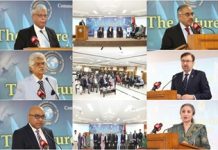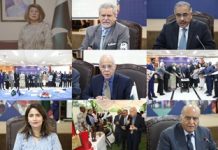It is not important from where you start to reach out to the ‘enemy’ other, from Tehran or Washington. What is important is the courage to take the first step and determine the right direction. With one telephone call from President Barack Obama to President Hassan Rouhani, the first by any American president in 34 years, a great moment seems to be arriving. The past history of relations between the two countries, the thick residue of antagonism and very strong national and regional lobbies that have vested interest in isolating and strangulating Iran, may work doubly hard to block the next steps.
Obama has, I believe, made history in sowing a new seed of reconciliation and rapprochement with Iran. I am sure more cautious analysts and observers, and also those with an agenda, would say it is too early to be so optimistic. True, very true, but what I am talking about is the first step, the seed and the direction. This is no mean achievement by itself; it is a great stride that will change the dynamics of conflict, peace, stability and many confused calculations of friendship and enmity in the region.
There is another reason for my raw optimism; the Iranians have taken the call, listened to the other side and are willing to engage with the US with dignity, respect and without any compromise on their sovereign national interest. Actually, the rush of steam that melted the ice came from remarkable developments, in Iran, in the recent past — notably, the election of Rouhani. He is moderate, pragmatic and flexible. He succeeds a hardliner patronised by the hard core elements of the clergy. Rouhani was not the preferred candidate of the clerical establishment. He rode to splendid victory on account of public disgust with the domestic and foreign policies of the hardliners.
Western sanctions and isolation for decades now have badly hurt the Iranian economy. It cannot produce and sell its essential natural resources, oil and gas without new technologies of production and access to markets that the sanction regime has blocked. The clerical establishment has in a way shown some realism by allowing President Rouhani some flexibility.
The big question is how flexible will he be on the nuclear issue. The United States and some of its regional European allies want to make sure that the Iranian nuclear programme remains under control and limited to the declaratory objective of Iran that it is only for ‘peaceful’ purposes. That is the ruse every proliferator has used. The Americans would insist on verifiable actions, timelines and quite intrusive inspections, if and when a deal is negotiated.
The road to Tehran is going to be rough and the diplomats traveling on it may encounter blind turns, considering the nuclear nationalism of Iran and its regional power ambitions that often don’t match its capacity. At the same time, President Rouhani has a limited window of opportunity provided by the clerical establishment to get Iran out of the present economic woes. Washington will do well by showing greater understanding of Rouhani’s domestic constraints. It will be sad if another reformist president after Mohammad Khatami is discredited by a weak international response.
The stage for a historic breakthrough between Iran and the West, if not fully set, is, at least, emerging. We, in the region, must watch carefully what follows the phone call. We expect great courage, prudence and statesmanship on both sides in the coming weeks and months. Keeping Iran isolated, heavily sanctioned and on the margins of the world community doesn’t serve the interest of regional and international peace.
Views expressed are of the author and do not necessarily reflect the views of ISS or of the Government of Pakistan.












